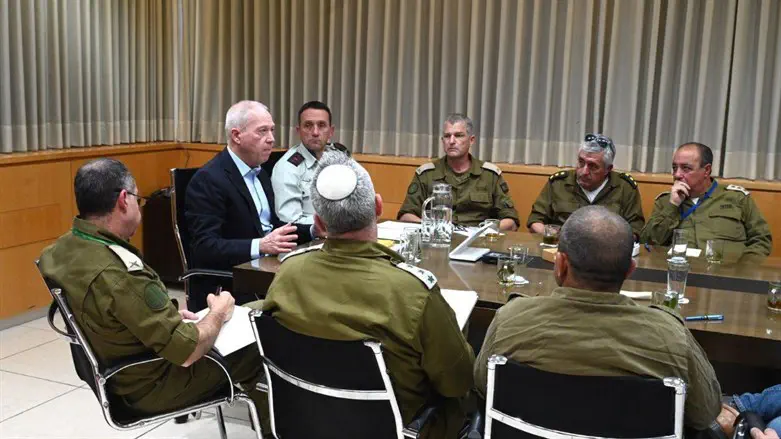
Defense Minister Yoav Gallant, Chief of Staff Herzi Halevi, and Reserve Forces Corps commander Benny Ben Ari held a discussion with soldiers and officers in the IDF reserves Tuesday afternoon.
The meeting, which was held in the Defense Minister's office in the Kirya, was attended by commanders and soldiers from the IDF reserves from all branches of the service, including the naval, intelligence, air, and land forces.
The soldiers discussed the announcement by many reservists that they would refuse to report for duty in protest against the government's planned judicial reforms.
Minister Gallant said: "It was important for me to hear you, I am the IDF's representative in the government, and the government's representative in the IDF. The situation before us is complex, we do not have the privilege to say that there are tasks that we will not take on due to one ideology or another, the effect of this is far-reaching."
He added that "the word refusal should remain out of the conversation. Refusal eats away at the most basic foundation of the state's existence - security, and we cannot allow that. Threats of refusal are playing with fire, we need to leave the IDF above any debate - allowing protests against the government is not a permit for acts against the state."
He commented on Communications Minister Shlomo Karhi's remark yesterday that reservists who refuse to report to duty can "go to hell."
"I intend to protect all reservists, even those whose opinions are the opposite of mine. “Those who disparage IDF soldiers, from the left or the right, have no place in public service. I cherish, appreciate and support the reservists, regardless of their political position,” he said.
Chief of Staff Herzi Halevi said: "Know that we all greatly appreciate the reserve officers. The IDF cannot operate without the reservists and there are entire frameworks that are based on the reserve system. Refusal is a red line. We cannot accept refusal nor the appearance of refusal."
"The IDF is the emergency system of the State of Israel, we all know how to treat an emergency system. It is not right to stretch it and weaken it. If something is weakened today, we may not be able to strengthen it again when we need it," Halevi said.
